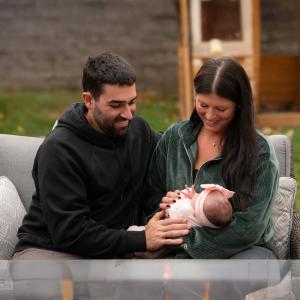
After learning about her inherited predisposition for breast and ovarian cancer, Rachel sought care from a team of experts at Perlmutter Cancer Center.
Photo: NYU Langone Staff
Rachel was only 14 years old when she lost her mother. She didn’t learn until she was older that her 41-year-old mother had died of metastatic breast cancer and that as a teenager she had lost her own mother to colorectal cancer.
When Rachel was 20, her gynecologist asked about her family history during an annual visit and recommended genetic testing through the High-Risk Cancer Genetics Program to better understand her hereditary risk for cancer. She received a positive test result for an inherited mutation in the BRCA1 gene that put her at higher risk for breast and ovarian cancer. Although Rachel met with a genetic counselor to discuss the results, she wasn’t prepared for the potential impact on her life. “I walked with that knowledge for many years, but simply blocked it all out,” she says.
Rachel was 32, engaged to be married, and working as a surgical technologist at a hospital when she felt ready to act on that knowledge. That’s when a friend encouraged her to see a specialist and recommended Freya R. Schnabel, MD, a surgical oncologist and director of breast surgery at NYU Langone’s Perlmutter Cancer Center.
Dr. Schnabel evaluated Rachel’s family and medical history and genetic test results, and discussed risk factors and options for preventive treatments. Dr. Schnabel also talked with Rachel about her plans to build her family and whether she wanted to have children—a decision that she had put on hold because of her potential cancer risk.
“Thanks to my physician, I will live to see my children grow, graduate, and get married.”—Rachel, Age 44
In consultation with Rachel, Dr. Schnabel recommended that she continue to have regular breast cancer screenings but wait until age 40 to have preventive surgery to reduce her risk of developing breast and ovarian cancer. With that advice, Rachel felt more reassured about the road ahead and went on to marry and have two children, a boy and a girl, over the next few years. “Dr. Schnabel is more than just my doctor, she’s like a family member,” Rachel says.
When she turned 40, Rachel had surgery to remove her ovaries and fallopian tubes. As an added precaution, she also chose to have a hysterectomy. Two years later, she had a bilateral mastectomy to remove both breasts, a procedure that was performed by Dr. Schnabel, followed by breast reconstruction surgery by Nolan S. Karp, MD.
At age 44, Rachel is free of the anxiety that she once felt about her future. Recently, she completed her master’s degree and training in school and mental health counseling and plans to work with young adults on mental health and wellness. Most of all, she’s enjoying watching her own children grow and being there for them throughout their lives. “With Dr. Schnabel’s guidance, I know I made the right decision. I didn’t want my children to lose their mother the way I did,” she says.

